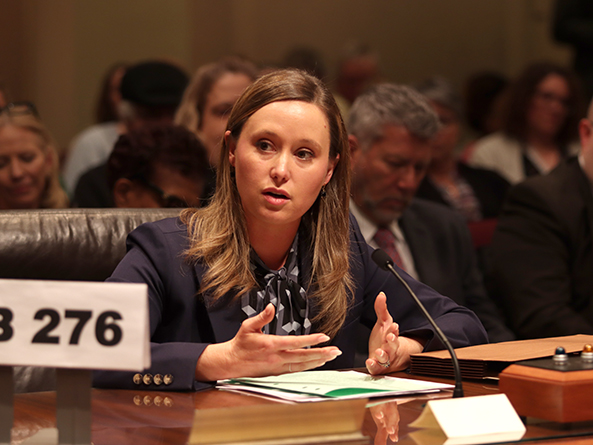Expansion of behavioral health coordination proposed
The Health and Human Services Committee heard testimony Feb. 23 on a proposal to implement a new statewide delivery model for behavioral health services.

LB276, introduced by Lincoln Sen. Anna Wishart, would adopt the Certified Community Behavioral Health Clinic Act in an attempt to increase access to outpatient mental health and substance abuse treatment through service delivery coordination with community partners.
The CCBHC model began in 2017 as a Medicaid demonstration project in collaboration with grants provided by the federal government.
Wishart said coordination between health care facilities and community partners is a key component to the success of the CCBHC model.
Rather than focusing only on health care challenges, she said, the state should be collaborating with law enforcement agencies, schools, hospitals, primary care providers and other organizations to help improve care, reduce recidivism and address health disparities.
“[The CCBHC model] glues investments together so that when an individual comes in and needs help, they’re getting the full array of support,” Wishart said. “It truly is a holistic approach.”
The state Department of Health and Human Services would be required to apply for a Medicaid state plan amendment through the federal Centers for Medicare and Medicaid Services to implement the bill’s provisions by Jan. 1, 2026.
Under the CCBHC model, DHHS would develop a prospective payment system through which providers would be reimbursed based on the anticipated cost of providing required services to Medicaid recipients on either a daily or monthly basis.
Gov. Jim Pillen testified in support of the proposal. One of the most important things the state can do is acknowledge that there are people in our communities who need help with mental health and substance use issues, he said.
“This bill is really important for us to step up and help,” Pillen said. “[The] services provided are person-centered, family-centered, recovery-oriented [and operate] with nationally developed criteria and standards.”
Carole Boyle, CEO of Community Alliance, also testified in favor of LB276, noting that the organization is one of five CCBHCs currently operating in Nebraska. CCBHCs are not new, she said, and are a framework by which services are organized and coordinated based on an individual’s needs.
Boyle said Community Alliance data indicates that, over a six-month period, the organization reduced the number of days participants were hospitalized by 242 and the number of days spent in jail by 54. Passage of LB276 would allow gathering of similar data on a statewide basis, she said.
“It’s really important to understand that our system right now is really fragmented and it’s really complex,” Boye said. “[LB276] is a model where we have to work together.”
Tony Green, interim director for the Division of Behavioral Health at DHHS, also testified in support. CCBHCs are designed to enhance access to comprehensive behavioral health care, he said, which includes 24/7 access to crisis services, care coordination to help navigate the health care system and access to all necessary social services to ensure that individuals are on the right path to recover.
“The enactment of LB276 is poised to make meaningful impacts on the estimated one in five Nebraskans with a mental illness and in the 88 counties considered mental health shortage areas,” Green said. “The CCBHCs will be a vital component in the modernization efforts of Nebraska’s behavioral health system.”
No one testified in opposition to the proposal and the committee took no immediate action.


